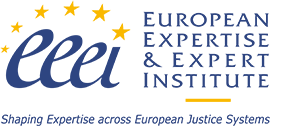On November 21st some 225 participants enjoyed the tenth yearly LRGD symposium. After a plenary morning program people where dispersed over 5 more specific programs.
The theme of the Symposium was “The Expert in his/her element”.
The Expert in his/her element
Judicial experts are maturing. Maturing in position in the system, in his/her function in the legal system and in his/her relation to the actors: parties, lawyers, judiciary and amongst each other.
Registered experts have an important role in party appointments. Knowing the way the legal procedure works, a party appointed experts add value to the process for his client, sometimes even so far that a legal procedure is no longer needed.
Registered experts are better known and better found by lawyers. In this way they propose a registered expert when a court decides to appoint one. The LRGD notices appointments where judges choose for an LRGD expert, reasoning that the proven quality of a registered expert is the better choice. Furthermore experts are more mature in their relation to each other. LRGD experts organise peer-to-peer sessions in which important knowledge and notions are shared.
Plenary morning sessions
During the plenary morning sessions two subjects where presented: the proposed changes in procedural law concerning civil evidence and the consequences of the GDPR for judicial experts.
At this moment a procedure is in progress on changing the procedural law for civil evidence. Two main subjects concerning experts are dealt with. The procedure for request of evidence is needed to be made faster and more efficient. For that the procedure for several request to the judge should be combined in one request and be done at the same time. For the process of appointing an expert parties should cooperate more before suggesting an expert to the judge. Judges in turn, should look more careful into the quality of party appointed experts investigation and reports, for usability, before appointing a new expert (in many cases the third expert to look into the case).
The GDPR and the Dutch Law “Uitvoeringswet AVG” (which holds specifics for The Netherlands) do not have specific ruling for judicial experts. Judicial expert should in most cases be seen as Controllers. This should mean that Data Subjects may have GDPR rights on the file that an expert is processing. For Civil, Administrative and Criminal Law this is in most cases an unwanted situation.
The LRGD is considering to ask the Ministry of Justice to look into this matter.
Afternoon sessions
In the afternoon participants visited one of 5 programs. These where organised by the LRGD Chambers:
- Land, Real estate, Building, Physical Environment
- Financials
- Human and Medical
- Varied Technical
- Information Technology
Per program there where three speakers that presented their subject.
- Property Act and the expert, Independence and impartiality of the judicial expert and Real estate experts in the web of disciplinary law for Chamber Land.
- DCF method disputed in court, homologation agreement and the expert, fact finding and gut feeling, forensic accountant, in Chambers Financials.
- Pitfalls in expertise proceedings looked upon by an expert, a lawyer and insurance company in the Chamber Human and Medical.
- Inspection of electric motors, position of the lawyer in expert investigation, do Eureka moments exist? in the chamber Varied Technical.
- Bottlenecks for lawyers, Suppliers, Clients and Experts in IT projects in the Chamber Information Technology.
In all programs there was room for active debate amongst participants.
Abstracts ( in Dutch) are available at
https://www.lrgd.nl/nl-nl/LRGD/Symposia/Symposium_2019_Materiaal
If you have any questions on a specific subject please contact or the speaker.
Information on the LRGD is partly in English available
https://www.lrgd.nl/en-gb/
Nico Keijser
LRGD, Secretary of the Board





